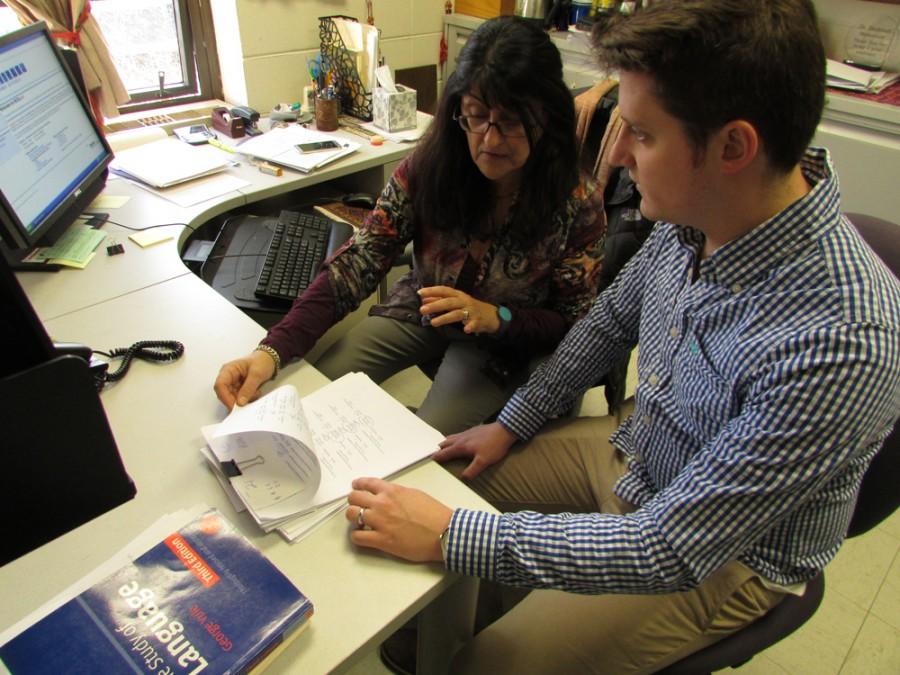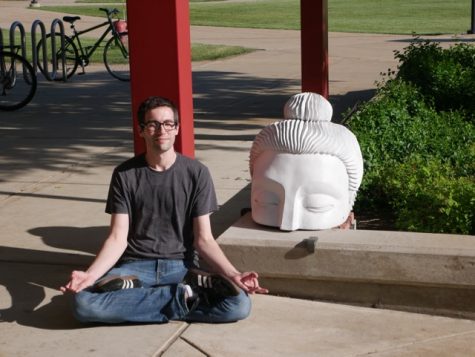Bilingual Brains and Cognitive Function
More News
One of the focal points of the research is language activation. Mahootian and Schott are trying to answer whether multiple languages are constantly active in the brain.
Being bilingual may be more of an asset than most people realize.
Dr. Shahrzad Mahootian, professor of linguistics, and Steven Schott, a linguistics graduate student, are conducting a study on language and brain function.
The study seeks to describe the effects of multilingualism on cognitive functions. Essentially, do bilingual brains work “harder or smarter” than monolingual brains when performing cognitive tasks?
“Many studies have shown that being bilingual actually helps protect against Alzheimer’s disease,” Schott said. “It delays the onset of dementia later in life. There are a lot of positive benefits to being bilingual.”
Specifically, the aim of the study is to answer three theoretical questions:
- Are bilinguals’ two languages in a state of constant and simultaneous activation?
- If yes, how does that affect cognitive functions and task performance?
- Are age of acquisition of the two languages and frequency of use of the two languages correlated with bilinguals’ performance?
Steven Schott is studying the effect of language exposure on cognitive function, as the basis of his thesis research.
“All of our research has been aimed at the psycho- and neurolinguistic element of linguistics.” Schott said. “Anyone in the department will tell you, I’m the one that sort of ‘twists the knife’ asking questions about how language works within the brain.”
Traditional studies in linguistics and cognition tend to focus on the brain in terms of monolingual function.
The few previous studies in multilingual cognition have been inconclusive, due in part to questions of methodology and whether bilingual participants’ two languages were unintentionally primed and activated. Language priming occurred when participants were given instructions in one language, and asked to perform tasks using the other.
One of the purposes of this study is to try to find a more definitive answer and address these problems in methodology.
To ensure the integrity of the research, details of the exact methods will be disclosed after the study is complete.
Participants are bilingual English-Spanish speakers and monolingual English speakers.
“To be accurate with analysis of the results of a study like this, you have to be accurate with your terminology, definitions and descriptions,” Mahootian said. “One of the issues that always come up, whether talking about cognition, bilingualism in society or educational policy, is how to define what a bilingual is.”
Bilingualism is not an all-or-nothing capacity; speakers are on a continuum from monolingual to various functional levels of bilingual.
According to Dr. Mahootian, from the speaker’s perspective, one key distinction speakers seem to make between simply comprehending a language and being bilingual is how they relate to and identify with the culture through the language.
Not surprisingly, as many studies in linguistics have shown, our identity is very closely tied to our language.
For this study, participants are asked to self-identify as either bilingual or monolingual. Although scientific description is elusive, a participant’s gut reaction to the question, “Are you bilingual?” turns out to be a fairly reliable answer.
“One of the things we had not counted on was how difficult it would be to find participants at NEIU who were monolingual,” Mahootian said.
Another aspect, neglected by previous studies, examines the age of language acquisition. Some people are born into multilingual homes, while others learn a language later in life. The age of acquisition may play a part in language activation, as it addresses differences in cognitive development.
There is still much work to be done. The study has been extended in order to gather more data.
“The results are interesting. They are starting to reveal a pattern,” Mahootian said. “But we still need many, many more participants.”
Your donation will support the student journalists of Northeastern Illinois University's The Independent, either in writers' payment, additional supplies and other items of note. Your contribution will allow us to purchase additional equipment for writers/photographers/illustrators and cover our annual website hosting costs.










